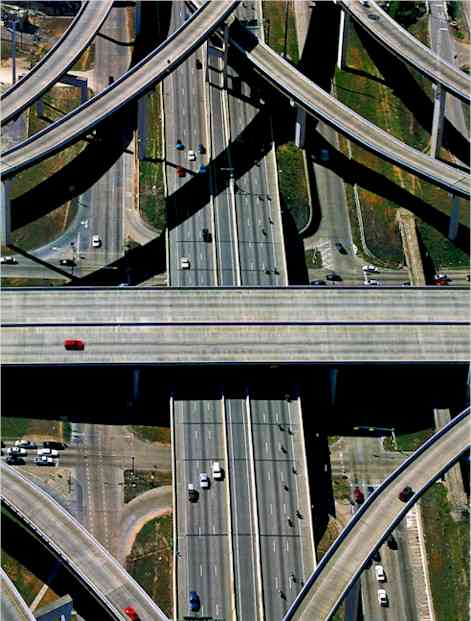Road Rage
On the Road to Testosterone-Fuelled RageI have some road rage inside of me. Traffic, especially in Los Angeles, is a pet peeve of mine. - Katie Holmes I don't like to hurt people, I really don't like it at all. - Jack Anderson The American male at the peak of his physical powers and appetites, driving 160 big white horses across the scenes of an increasingly open society, - John Sloan Dickey
by Kathleen Kelleher One time in a Washington, DC traffic jam, I saw two guys driving nice cars reach a point where their lanes were supposed to merge. But neither one would yield, so they very slowly - we are talking maybe one mile per hour - drove into each other. It was the world's most avoidable accident, but these guys had no choice. Testosterone made them crash into each other. - from Dave Barry's Complete Guide to Guys
But young men are not the only offenders. Women (who have rammed other vehicles and run over pedestrians) and placid middle-aged men (like the church deacon from New Bedford, Massachusetts, who fired a crossbow, killing the driver who cut him off) also snap. How is it that a banal act like changing lanes can evoke such hostility? Why do all the rules of civility fly out the car window on the roadway? Why must the human animal, once encapsulated in high-speed metal cocoons, be the first, fastest and baddest of the pack? "This competitiveness on the road is similar to what you see in all social mammals," says Arnold Nerenberg, a Whittier psychologist who describes himself as America's road rage therapist. "There is this 'I will not let you get ahead of me.'" This would be fine if everyone were travelling single file on a trail. But our culture (read: the car) has outpaced our brain." "We obviously haven't evolved for anything as dangerous as cars," says Don Symons, an evolutionary psychologist at UC Santa Barbara. "Even road rage apart, cars are very dangerous. It is very hard to get us to understand that. With snakes, you don't have any problem feeling fear," he says. But, "our emotions, levels of fear and caution don't appear to be evolved for driving, much less for people carrying weapons." What sets the Mad Max-type apart from other drivers is a tendency to measure his self-worth by his "achievements" on the highway and propensity to get peeved over trivial matters, says Dr John Larson, a Norwalk, Connecticut, psychiatrist and author of Steering Clear of Highway Madness (Book Partners, 1996). On this "self-esteem battleground," anything impeding these drivers, say, from hurtling in the fast lane at 95 mph or getting to the Valley from the airport in 20 minutes, ignites hostility. A factor in unloading rage on the road is that other drivers are virtual strangers, Nerenberg says. "There is an urge to express hostility toward an anonymous other in the human psyche when we feel justified. This manifests not only on the road but in warfare. I don't know Joe. I don't have to face him tomorrow. Joe only has a two-dimensional reality. He is a guy who is defined strictly by what he did to me." Feeling threatened by another driver's actions - with getting cut off as the #1 irritant - is the biggest trigger to rage,says David K Willis, president of the AAA Foundation for Traffic Safety. Tailgating and hogging the fast lane follow cutting off as the most provoking driving behaviours. "People just cross over into this invisible boundary to madness over these things," he says. But why does the human psyche cede to its competitive impulses over an action that can be altruistic? After all, the only personal cost for letting someone merge may be two more minutes in the car. If you are already in a competitive or angry mood while driving, you are not likely to be charitable. The brain is structured, Larson says, so that our mood influences how we see things and react to them. "When you are competing, your consciousness is focused on beating the other driver," he says. "The ability to experience compassion or the possible motivation of the other driver is diminished. You can't even hear your husband or wife talking to you. There is a whole decline in the ability to perceive." But we may come to our senses yet. Just making a conscious effort to change perspectives can inspire an epiphany. Such a transcendental moment swooped down upon one jerky driver like a good swift kick to the pants. Larson recounts a story of a man who drove down the street and came upon a man and a woman walking at snail's pace across the street. The driver grew so enraged that he began yelling and gesturing. The pedestrian gestured and yelled back. The driver got out of his car and shook the male pedestrian, at which point, the pedestrian said, "Can't you see, I am helping my crippled wife cross the street?" His anger shrivelled in a torrent of shame and embarrassment; the driver slid back into his car, his perspective from behind the wheel altered forever. Source: The Times Tuesday 23 September 1997
Keeping Your Cool
There are several articles in this section concerned with gender. Among them are:
For articles on poverty, social markets, superfluous children, isolation, modern mating difficulties, status, boasting, gender differences, patriarchy, capitalists, civility, groups, racism, virtue,
ethics, art, music, religion and crewing click the "Up" button below to take you to the Index page for this Social/Cultural section. |
 Animals
Animals Animation
Animation Art of Playing Cards
Art of Playing Cards Drugs
Drugs Education
Education Environment
Environment Flying
Flying History
History Humour
Humour Immigration
Immigration Info/Tech
Info/Tech Intellectual/Entertaining
Intellectual/Entertaining Lifestyles
Lifestyles Men
Men Money/Politics/Law
Money/Politics/Law New Jersey
New Jersey Odds and Oddities
Odds and Oddities Older & Under
Older & Under Photography
Photography Prisons
Prisons Relationships
Relationships Science
Science Social/Cultural
Social/Cultural Terrorism
Terrorism Wellington
Wellington Working
Working Zero Return Investment
Zero Return Investment
 Road pathology, Dave Barry surmises, is strictly a guy thing. For the most part, he is right. About 96%
of drivers who have been involved in a violent clash with another driver were young men, a recent American Automobile Association study reports. Some incidents are lethal, such
as the recent case of a San Bernardino father who attempted to pass a car driven by two men. The two men braked alongside the man's car, fired bullets into it and killed the man's toddler son.
Road pathology, Dave Barry surmises, is strictly a guy thing. For the most part, he is right. About 96%
of drivers who have been involved in a violent clash with another driver were young men, a recent American Automobile Association study reports. Some incidents are lethal, such
as the recent case of a San Bernardino father who attempted to pass a car driven by two men. The two men braked alongside the man's car, fired bullets into it and killed the man's toddler son. Following are some tips on how to drive without flying into a blind rage:
Following are some tips on how to drive without flying into a blind rage: Sources: Dr John Larson, psychiatrist and author of Steering Clear of Highway Madness (Book Partners, 1996),
Sources: Dr John Larson, psychiatrist and author of Steering Clear of Highway Madness (Book Partners, 1996),